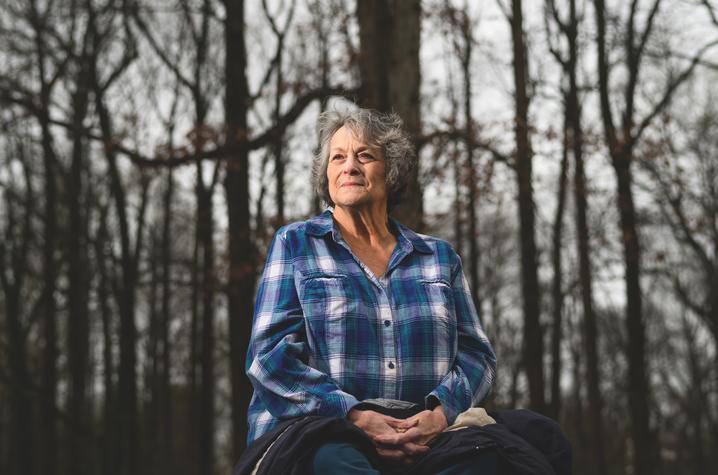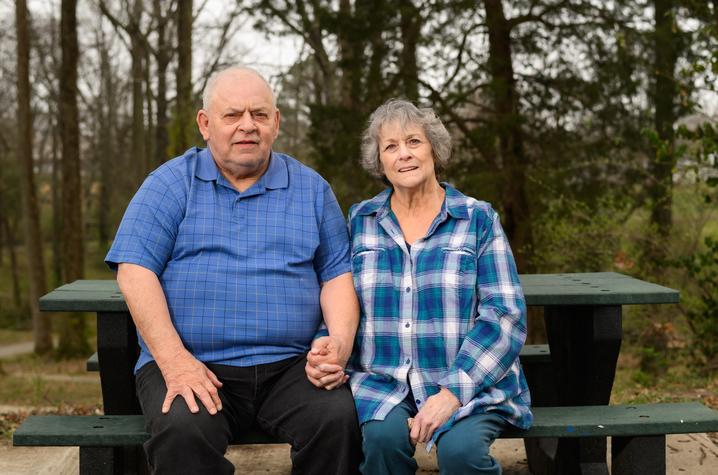Markey networks bring latest clinical trials home to patients
LEXINGTON, Ky. (Sept. 5, 2025) — When Glasgow, Ky., resident Debra Kantosky got a diagnosis of lung cancer in December of 2023, she was told that if she quit smoking, she’d have a better chance of a good outcome.
“But when you’ve smoked for 52 years, you really have to wrestle with yourself whether it’s something you want to do and can do,” Kantosky said.
When patients and clinical trials connect
Then Kantosky was offered the opportunity to participate in a clinical trial at The Medical Center at Bowling Green — a member of the University of Kentucky Markey Cancer Center Affiliate Network — to determine if allowing patients to choose their own tobacco cessation treatment and level of coaching helps them quit.
“This was a completely personal, mental battle,” Kantosky said. “I had tried nicotine patches years ago and they didn’t do it for me. This time, I was able to chew nicotine gum, and I discovered that the nicotine pouches that you put in your mouth and then remove quickly helped.”
She also found that keeping her hands busy — doing puzzles, coloring, gathering and cracking pecans and chopping vegetables — lessened the temptation to grab a cigarette.
The former pack-a-day smoker was able to quit, thanks to The Tobacco Treatment Optimization and Preferences during Concurrent Cancer Treatment (TTOP) trial and her own determination.
“It is a big deal that Debra stopped smoking,” said Diego Cabrera, M.D., Kantosky’s medical oncologist at The Medical Center at Bowling Green. “Research shows that patients do worse if they continue to smoke while they are receiving treatment for cancer. It’s clear that if they continue to smoke after treatment, they have a greater chance of cancer relapse and death than nonsmokers.”
The Medical Center at Bowling Green became a member of the UK Markey Cancer Center Affiliate Network (MCCAN) in 2016 and the Markey Cancer Center Research Network (MCCRN) in 2021. The networks connect community hospitals across Kentucky and beyond with the comprehensive resources and expertise at Markey. Like many of Kentucky’s hospitals with growing cancer programs, The Medical Center at Bowling Green didn’t offer clinical trials at the time. But with MCCRN’s guidance, its first clinical study was up and running in October of 2022.
“Clinical trials provide access to cutting edge care," said Cheri Tolle, administrative director of MCCAN. “Participation in trials is a best practice and while patients do travel to Lexington from across the state and even outside of Kentucky to take part in trials, there are many barriers, from socioeconomic to health complications, that make it too difficult for many to make the trip.”
Cabrera agrees.
“The Wall Street Journal labeled it the ‘cancer commute,’” he said. “Providing care closer to home is pivotal.”
In addition to the TTOP trial, Kantosky is also part of UK’s Precision Medicine Randomized Clinical Trial Comparing Molecular Tumor Board Assisted Care to Usual Care (PRiMAL) study. The TTOP and PRiMAL trials were developed and are led by Markey clinician investigators Joseph Valentino, M.D., and Timothy Mullett, M.D.
“We test the DNA of a patient’s cancer and look for particular mutations that can drive that cancer,” Cabrera said. “Some of those mutations have treatment indications.”
Markey’s Molecular Tumor Board, a forum of UK experts, reviews any abnormalities and provides guidance on patient-specific targeted therapies. Cabrera hopes that the study will help identify which types of patients might benefit most from the review.
“The support from MCCRN has really been wonderful and has been a huge part of our success,” said Tina Berger, oncologic clinical research coordinator for Bowling Green. “We are happy that we can offer trials right here in our patients’ backyards. Your heart just goes out to them, and when we see someone like Debra quit smoking, we are elated.”
Kantosky was a bit apprehensive before beginning chemotherapy and radiation therapy because she watched two of her sisters, who had other types of cancer, suffer from the side effects before they died from their disease. She feels fortunate that she had few problems. Last May, she began immunotherapy and she continues with a monthly infusion for maintenance.
“I feel pretty well and the tumors have shrunk. One they can’t even see anymore and another is much smaller,” she said.
The news is welcome because Kantosky and her husband have plans. Every July 4th since 1992, they’ve hosted as many as 36 family members for a reunion, and now everyone chips in to plan the event. She also creates hand-made Christmas stockings for her relatives, this past year adding two more to the collection — one for her new daughter-in-law and another for her third great-grandchild.
“I’m 73, and I expect to do the same things as when I was 43,” Kantosky said. “But I just absolutely eat my great-grandchildren up and love doing all kinds of activities with them.”
UK HealthCare is the hospitals and clinics of the University of Kentucky. But it is so much more. It is more than 10,000 dedicated health care professionals committed to providing advanced subspecialty care for the most critically injured and ill patients from the Commonwealth and beyond. It also is the home of the state’s only National Cancer Institute (NCI)-designated Comprehensive Cancer Center, a Level IV Neonatal Intensive Care Unit that cares for the tiniest and sickest newborns and the region’s only Level 1 trauma center.
As an academic research institution, we are continuously pursuing the next generation of cures, treatments, protocols and policies. Our discoveries have the potential to change what’s medically possible within our lifetimes. Our educators and thought leaders are transforming the health care landscape as our six health professions colleges teach the next generation of doctors, nurses, pharmacists and other health care professionals, spreading the highest standards of care. UK HealthCare is the power of advanced medicine committed to creating a healthier Kentucky, now and for generations to come.






